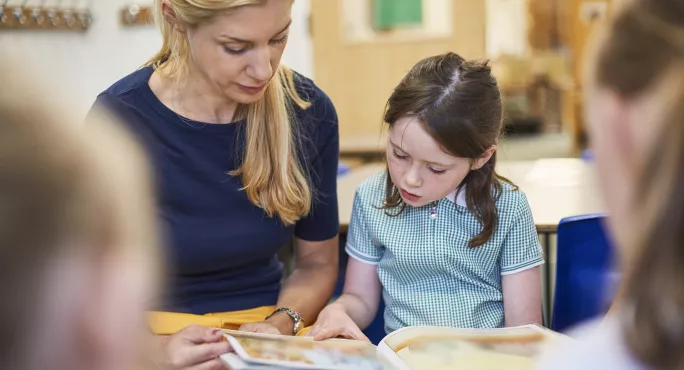Pandemic catch-up must focus on those in need

At the National Foundation for Educational Research (NFER), we have been in the privileged position of following over 6,000 pupils on their educational journey from Reception and Year 1 since 2020 - and the Covid-19 pandemic - to understand the long-term impact on pupils’ attainment and social skills.
Three years on, as part of a research project commissioned and funded by the Education Endowment Foundation, we have observed some encouraging signs of recovery but our results also highlight the continued impact on the very lowest attainers and disadvantaged pupils.
The disruption to schools between spring 2020 and summer 2021 was unprecedented, with periods of partial school closures and online learning.
Where the problems lie
Once schools re-opened, they worked hard to put in place support for learning recovery, focusing on small group tuition and amended curriculums.
Schools faced high levels of pupil and staff absence as the effects of the pandemic continued into 2021-22, and in 2022-23 schools told us they were particularly focusing their support on their lowest attainers and disadvantaged pupils.
Indeed, our results suggest these pupils need that focused support the most. We have found a much larger proportion of very low attainers in reading than might be expected (compared with reading levels before the pandemic), particularly among the youngest year group we are following.
These pupils (in Year 3 in 2022-23) were in Reception during the initial period of school closures, and it seems they have been particularly affected by missed learning during their youngest years at school.
The proportion of very low attainers in reading from this cohort is nearly twice as high as that in the pre-pandemic sample.
This represents a substantial challenge for teachers and support staff in their day-to-day classrooms, particularly in schools in disadvantaged areas, which are more likely to have higher proportions of lower-performing pupils.
The disadvantage gap remains
Like other researchers (Blainey and Hannay, 2021; Andrews, 2023; Kennedy and Strietholt, 2023), we have also found that the gap between disadvantaged pupils and their peers remains persistently wide.
Both Year 3 and Year 4 pupils eligible for free school meals were estimated to be around seven months behind more well-off peers for reading in spring 2023, and around six months behind peers in maths.
The disadvantage gap in reading has remained stubbornly wide over the three years of our study, and it remains wider than similar gaps reported before the pandemic.
For maths, the disadvantage gap has reduced slightly as our pupils have moved from Years 1 and 2 to Years 3 and 4, suggesting some promising improvement. However, it is still wider than gaps reported before the pandemic.
The vast majority of schools indicated that they had provided additional maths support for both disadvantaged pupils and low attainers, including one-to-one catch-up; and this may be impacting positively on the recovery we are seeing in the pupils’ maths results. Schools also reported implementing additional support in reading.
Pupil premium funding impact
However, this was to a lesser extent than in maths, and this may be reflected in the extent of recovery that we see in reading, with very low attainers still struggling.
Government policy aims to address the disadvantage gap through programmes such as the National Tutoring Programme (NTP) and schools’ pupil premium (PP) funding.
Nearly half of schools in our spring 2023 survey reported that they were providing tutoring for reading and maths recovery specifically through the NTP.
However, schools have many competing spending needs and in another NFER national survey earlier this year, exploring wider aspects of tutoring, only two-fifths of senior leaders felt that providing tutoring for disadvantaged pupils was their top priority for their PP spending.
Meanwhile, the Sutton Trust (2023) highlighted hiring teaching assistants as primary schools’ top PP priority. The evidence on learning recovery across subjects or year groups is not yet conclusive (Andrews, 2023; Kennedy and Strietholt, 2023), or about how best to achieve this.
Is it time to focus on disadvantage?
For example, many school leaders (around two-fifths in our wider tutoring survey) believe that other forms of support help disadvantaged pupils more so than small-group or one-to-one tuition.
However, the level of funding to support pupils’ missed learning (through tutoring or otherwise) was a key concern in our spring survey.
Continuing to track the disadvantage gap and the approaches used by schools is important, to inform schools where best to focus their efforts and resources.
Given early signs of recovery overall, contrasted with the picture for very low attainers and disadvantaged pupils, are we now at a point where schools should focus specifically on addressing the disadvantage gap?
If so, schools need to be supported with sustainable PP funding and evidence-based guidance on how to spend it.
Pippa Lord is research director at the National Foundation for Educational Research and co-author of the report
You need a Tes subscription to read this article
Subscribe now to read this article and get other subscriber-only content:
- Unlimited access to all Tes magazine content
- Exclusive subscriber-only stories
- Award-winning email newsletters
Already a subscriber? Log in
You need a subscription to read this article
Subscribe now to read this article and get other subscriber-only content, including:
- Unlimited access to all Tes magazine content
- Exclusive subscriber-only stories
- Award-winning email newsletters
topics in this article



